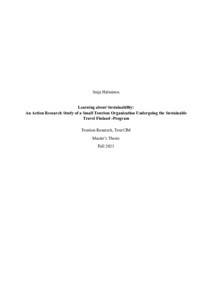Learning about Sustainability: An Action Research Study of a Small Tourism Organization Undergoing the Sustainable Travel Finland -Program
Halminen, Saija (2021-12-15)
Halminen, Saija
Lapin yliopisto
15.12.2021
Julkaisun pysyvä osoite on
https://urn.fi/URN:NBN:fi-fe2021121560762
https://urn.fi/URN:NBN:fi-fe2021121560762
Tiivistelmä
Sustainability has become the integral focus in tourism during the past years. Since the industry is very prone to global threats like the climate change, sustainability management has to become more comprehensive and the common responsibility of all tourism organizations. Small tourism organization have the tendency for the lack of systematic sustainability work and silent sustainability actions, meaning the work done as a part of the everyday actions without even knowing it could be related to sustainability. These actions are not measured, communicated, or given a deeper attention, so the work is not that efficient and doesn’t cover all the dimensions of sustainability. Previous research about sustainability management has been focusing on for example competitive advantages and improvement of market position, but there is a lack of research about what can organizations learn through their sustainability management journey. Also, in many cases the research focus has been on larger organizations, even though small and medium size organization represent the majority in the tourism field.
If an organization wants to develop and grow, learning is an integral part of the process. Therefore, this research is focusing on the learning journey of a small tourism organization operating in the northern Finland with the intention of improving their sustainability management with the help of a sustainability management program called Sustainable Travel Finland (STF). The main research question is: How can sustainability management programs support sustainability learning in small tourism organizations? The methodological approach of the research is an action research study, and the empirical data is collected through participant observation and semi-structured interviews.
The findings show that among small tourism organizations it was possible to identify a three-step learning path, where learning is experienced in different forms. The steps include finding a purpose for the sustainability work, learning about their current sustainability knowledge, and transferring new knowledge into actions. The STF-program was seen as an effective tool especially for small tourism organizations. It was showed how these organizations are able to identify their strengths, current knowledge and find new development aspects which were able to transfer into practical actions with the use of new management tools and systematic working. It was also found that the STF-program was supporting the continuous sustainability learning and helping small tourism organizations to plan long-term strategies and goals for the future.
If an organization wants to develop and grow, learning is an integral part of the process. Therefore, this research is focusing on the learning journey of a small tourism organization operating in the northern Finland with the intention of improving their sustainability management with the help of a sustainability management program called Sustainable Travel Finland (STF). The main research question is: How can sustainability management programs support sustainability learning in small tourism organizations? The methodological approach of the research is an action research study, and the empirical data is collected through participant observation and semi-structured interviews.
The findings show that among small tourism organizations it was possible to identify a three-step learning path, where learning is experienced in different forms. The steps include finding a purpose for the sustainability work, learning about their current sustainability knowledge, and transferring new knowledge into actions. The STF-program was seen as an effective tool especially for small tourism organizations. It was showed how these organizations are able to identify their strengths, current knowledge and find new development aspects which were able to transfer into practical actions with the use of new management tools and systematic working. It was also found that the STF-program was supporting the continuous sustainability learning and helping small tourism organizations to plan long-term strategies and goals for the future.
Kokoelmat
- Pro gradu -tutkielmat [4969]
